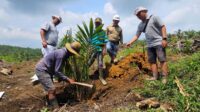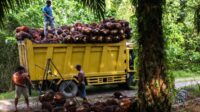PALMOILMAGAZINE, JAKARTA — Amid growing global debates on sustainability, palm oil remains Indonesia’s key export commodity. In 2023, the sector contributed 3.5% to the national Gross Domestic Product (GDP) and generated US$28.4 billion in foreign exchange—equivalent to 11.6% of total non-oil and gas exports. The palm oil industry also supports millions of livelihoods, with around 16.2 million Indonesians depending on the sector, either through direct employment in plantations or in downstream industries.
However, behind these impressive figures, smallholder farmers remain the most vulnerable link in the supply chain. They manage around 41% of Indonesia’s total oil palm area but face increasing uncertainty—particularly with the European Union Deforestation Regulation (EUDR) set to take effect in June 2026.
During a Focus Group Discussion titled “Barriers and Opportunities for Smallholder Participation in the Global Palm Oil Market” organized by the Institute for Development of Economics and Finance (INDEF), stakeholders—including government representatives, farmer associations, business players, and academics—agreed that an integrated national strategy is essential to ensure smallholders are not excluded from global trade.
Imaduddin Abdullah, INDEF’s Director of International Cooperation, emphasized the need to safeguard farmers’ interests. “This discussion is aimed at protecting smallholders from the risk of exclusion from global markets due to international regulations,” he said, as reported by beige-heron-208544.hostingersite.com on Wednesday (October 8, 2025).
Meanwhile, INDEF researcher Afaqa Hudaya highlighted fundamental issues still faced by smallholders, such as unclear land legality and weak institutional structures. About 62% of smallholder oil palm land is still classified as forest area, even though some already possess land ownership certificates. This situation limits farmers’ access to financing and replanting programs supported by the Plantation Fund Management Agency (BPDP). Out of 6.2 million hectares of smallholder plantations, only about 1% has obtained ISPO certification, despite the system being in place for over a decade.
“Our farmers still operate individually, with limited access to capital, mentoring, and sustainability certification,” Afaqa explained.
Field challenges were also raised by Djono Albar Burhan, Head of International Relations and People Development at APKASINDO. He pointed to persistent price disparities in Fresh Fruit Bunches (FFB), poor traceability that reduces selling prices, and limited access to modern technology. “Price deductions can reach hundreds of thousands of rupiah per ton simply because traceability systems are incomplete,” he said.
According to INDEF’s 2024 study, non-compliance with the EUDR could reduce palm oil prices by 1–9% and increase rural poverty by up to 17%. This is concerning given that smallholder productivity remains low, averaging only 10–15 tons of FFB per hectare, while applying Good Agricultural Practices (GAP) could boost yields to 30–40 tons with an oil extraction rate of 23–25%.
Another longstanding issue lies in the lengthy supply chain. Data from the Ministry of Agriculture shows that FFB distribution from independent farmers to mills often passes through multiple intermediaries, depressing farm-gate prices and complicating traceability—a key requirement for EUDR compliance.
The government has begun to respond. Through Presidential Regulation No. 132 of 2024 and Ministerial Regulation No. 05 of 2025, the Ministry of Agriculture has allocated BPDP funds to strengthen smallholder human resources through technical training, vocational programs, entrepreneurship, and farmer-led extension initiatives. The Smallholder Replanting Program (PSR) also aims to rehabilitate 120,000 hectares of plantations annually, complemented by ISPO certification and financing support via the BPDP and People’s Business Credit (KUR).
The government is also promoting cooperative-based partnerships between farmers and companies under the principle of “cooperation, not competition”—to shorten supply chains and strengthen farmers’ bargaining position in the market.
At the close of the discussion, participants agreed on three priority actions:
- Land legality reform, by aligning STDB or e-STDB as the main instrument under the One Map Policy;
- Strengthening farmer institutions, through cooperatives that facilitate collective certification and establish Internal Control Systems (ICS);
- Accelerating supply chain digitalization, by developing a national dashboard integrating land, production, and transaction data using affordable digital technologies.
“The postponement of the EUDR must be used as a window of opportunity to build smallholder capacity, simplify regulations, and secure funding support—particularly for STDB and replanting programs,” Imaduddin concluded. (P1)





































